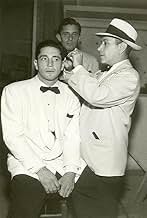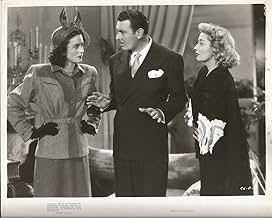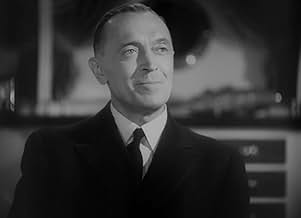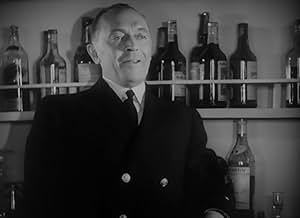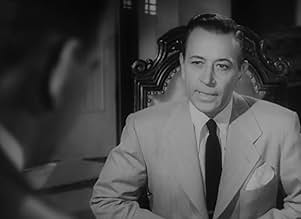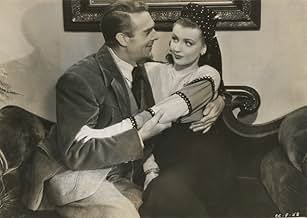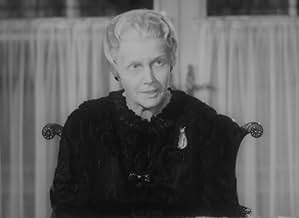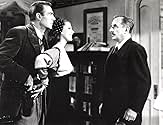To save her fortune from a designing nephew, Matilda Reed must locate her three long-lost adopted sons in time for a Christmas Eve reunion.To save her fortune from a designing nephew, Matilda Reed must locate her three long-lost adopted sons in time for a Christmas Eve reunion.To save her fortune from a designing nephew, Matilda Reed must locate her three long-lost adopted sons in time for a Christmas Eve reunion.
Douglass Dumbrille
- Dr. Bunyan
- (as Douglas Dumbrille)
Featured reviews
BEWARE OF FALSE REVIEWS & REVIEWERS. SOME REVIEWERS HAVE ONLY ONE REVIEW TO THEIR NAME. NOW WHEN ITS A POSITIVE REVIEW THAT TELLS ME THEY WERE INVOLVED WITH THE FILM. IF ITS A NEGATIVE REVIEW THEN THEY MIGHT HAVE A GRUDGE AGAINST THE FILM . NOW I HAVE REVIEWED OVER 200 HOLIDAY FILMS. I HAVE NO AGENDA. I AM HONEST!
Matilda Reid (Ann Harding) is in danger of being declared senile at the urging of her nephew, Phillip (Reginald Denny). To keep him from controlling her estate, Matilda must find her three adopted sons, who left home long ago. One of them, Michael (George Brent), lives in New York, where he's incurred a $75,000 debt. Another, fugitive Mario (George Raft), is hiding in South America. The last, Jonathan (Randolph Scott), is a small-time cowboy. All three must come home to save Matilda's fortune.
Now this film is nice change of pace from "HALLMARK MOVIES". The cast brings the most out of a screenplay that is most confusing. I have to admit that I watch this in over 3 evenings so I will have to re- watch it again. The film is enjoyable. I will watch it again.
Matilda Reid (Ann Harding) is in danger of being declared senile at the urging of her nephew, Phillip (Reginald Denny). To keep him from controlling her estate, Matilda must find her three adopted sons, who left home long ago. One of them, Michael (George Brent), lives in New York, where he's incurred a $75,000 debt. Another, fugitive Mario (George Raft), is hiding in South America. The last, Jonathan (Randolph Scott), is a small-time cowboy. All three must come home to save Matilda's fortune.
Now this film is nice change of pace from "HALLMARK MOVIES". The cast brings the most out of a screenplay that is most confusing. I have to admit that I watch this in over 3 evenings so I will have to re- watch it again. The film is enjoyable. I will watch it again.
What's a mother to do? If she's the seriously rich, eccentric but still shrewd Mathilda Reed, now in her late seventies or early eighties and living alone with servants in a huge mid-town Manhattan mansion, and her untrustworthy nephew attempts to gain control of her fortune by having her declared incompetent, the answer is simple. She'll call upon her three sons. The trouble is, she hasn't heard from the grown men in years. The three came to her as wards. She adopted them and raised them. But when they were grown, each decided to leave and make his own way. They didn't want to be a burden or to live off their mother's fortune. Mathilda Reed (Ann Harding) may be a wonderful old woman, but her sons are something else.
There's Michael (George Brent), a high-living ne'er-do-well who finances his expensive tastes by kiting checks and who hopes to marry a rich woman. His girlfriend, Ann (Joan Blondell), is starting to get impatient.
There's Jonathan (Randolph Scott), who went west and now is a broken down but charming rodeo rider who sometimes has to pawn his saddle.
And there's Mario (George Raft), a fugitive from the law who went to South America and prospered as a shady nightclub owner. He can't return to the States without the FBI picking him up.
Mathilda Reed is a fighter. She goes public with a press conference, hoping her sons, wherever they are, will hear about her need for them. She hires a private detective to try and locate them. They have to return by Christmas Eve to block Phillip's plans.
Will the three men make it? Will they even try? Well, of course they will. So we spend most of our time in three short stories. We watch how Michael, amusing and unreliable, gets himself under Phillip's thumb with those bad checks and then starts to get himself out. We watch how Jonathan, back in New York, finds himself involved in a phony adoption scam and winds up with three baby girls and a great-looking girlfriend. We also hear a lot of Hollywood home-on-the-range dialogue...all those "heifers." We see Mario take on a Nazi fugitive, with fistfights and gunfights, before he leaves for New York with the FBI right behind him. And on Christmas Eve, with snow drifting down, with the mansion alight, with the tree gorgeously decorated and the Christmas punch made, Mathilda Reed, her nephew and the judge sit waiting. Sure enough, first Michael and Ann arrive. Then Jonathan and his three babies. And last comes Mario, with an FBI man right behind. We learn everything is going to turn out all right, even for Mario. The "crime" he left the States over was really committed by another. Phillip's scheme is dealt with and so is Phillip. Most importantly, we learn that the idea of family, played up with a little sentimentality and a sometimes serious but often amusing screenplay, can get the job done.
The movie is a little corny at times, especially with Ann Harding, younger than each of the actors playing her sons, doing the trembling and wise old lady bit. Her makeup would convince only the oldest residents of an assisted living center. Raft, Scott and Brent each do fine jobs. Raft, of course, is Raft, and his story is the most serious. Scott does a charming turn as the rodeo cowboy who winds up with an instant family. And George Brent, who was even better as a skilled farceur and light comedian than he was as an all-purpose leading man (watch him in 1947's Out of the Blue), is a joy to watch. All three were at turning points in their careers. This was Scott's last non-Western movie. Brent was fading fast as a star. Raft was starting to make a series of poor movies. Still, for me the movie works emotionally as the story of how three very different men drop whatever they're doing, for some at great risk, to return to help the woman who raised them and gave them the values that they have. When the three start to greet each other with pleasure in their mother's mansion on Christmas Eve, maybe it's just good acting but they look like they mean it.
There's Michael (George Brent), a high-living ne'er-do-well who finances his expensive tastes by kiting checks and who hopes to marry a rich woman. His girlfriend, Ann (Joan Blondell), is starting to get impatient.
There's Jonathan (Randolph Scott), who went west and now is a broken down but charming rodeo rider who sometimes has to pawn his saddle.
And there's Mario (George Raft), a fugitive from the law who went to South America and prospered as a shady nightclub owner. He can't return to the States without the FBI picking him up.
Mathilda Reed is a fighter. She goes public with a press conference, hoping her sons, wherever they are, will hear about her need for them. She hires a private detective to try and locate them. They have to return by Christmas Eve to block Phillip's plans.
Will the three men make it? Will they even try? Well, of course they will. So we spend most of our time in three short stories. We watch how Michael, amusing and unreliable, gets himself under Phillip's thumb with those bad checks and then starts to get himself out. We watch how Jonathan, back in New York, finds himself involved in a phony adoption scam and winds up with three baby girls and a great-looking girlfriend. We also hear a lot of Hollywood home-on-the-range dialogue...all those "heifers." We see Mario take on a Nazi fugitive, with fistfights and gunfights, before he leaves for New York with the FBI right behind him. And on Christmas Eve, with snow drifting down, with the mansion alight, with the tree gorgeously decorated and the Christmas punch made, Mathilda Reed, her nephew and the judge sit waiting. Sure enough, first Michael and Ann arrive. Then Jonathan and his three babies. And last comes Mario, with an FBI man right behind. We learn everything is going to turn out all right, even for Mario. The "crime" he left the States over was really committed by another. Phillip's scheme is dealt with and so is Phillip. Most importantly, we learn that the idea of family, played up with a little sentimentality and a sometimes serious but often amusing screenplay, can get the job done.
The movie is a little corny at times, especially with Ann Harding, younger than each of the actors playing her sons, doing the trembling and wise old lady bit. Her makeup would convince only the oldest residents of an assisted living center. Raft, Scott and Brent each do fine jobs. Raft, of course, is Raft, and his story is the most serious. Scott does a charming turn as the rodeo cowboy who winds up with an instant family. And George Brent, who was even better as a skilled farceur and light comedian than he was as an all-purpose leading man (watch him in 1947's Out of the Blue), is a joy to watch. All three were at turning points in their careers. This was Scott's last non-Western movie. Brent was fading fast as a star. Raft was starting to make a series of poor movies. Still, for me the movie works emotionally as the story of how three very different men drop whatever they're doing, for some at great risk, to return to help the woman who raised them and gave them the values that they have. When the three start to greet each other with pleasure in their mother's mansion on Christmas Eve, maybe it's just good acting but they look like they mean it.
In a reworking of the plot of Beau Geste, imagine if you will the Geste brothers leaving the Foreign Legion and coming home to save their the lady who raised them as wards from the depredations of her blood nephew and you've got Christmas Eve. Ann Harding took in three orphans and they all went out on their own and haven't really kept in touch with Harding. They've all chosen three different roads of life and they haven't made a great success in any way.
Which leads us into three different stories as each foster son hears about what Harding is going through and her public call for help. The strongest of the stories is Raft's who is leading a Lucky Luciano like exile in South America where he owns a club, has his hands in the local rackets, but can't return to the USA. Of course he gets back as do the others, but the story is in the how.
George Brent is a part time playboy, part time conman who is ready to marry a bankroll in Molly Lamont to the chagrin of longtime girl friend Joan Blondell. The weakest story and silliest is Randolph Scott's who is a rodeo cowboy who while on the way home gets himself involved with Dolores Moran who is a reporter trying to break up a baby adoption racket run by Douglass Dumbrille.
Reginald Denny is the nephew and that's another weakness in the plot. He's actually shown at first to be sincerely concerned about his aunt and truth be told Harding's getting a bit dotty. In the end he's revealed rather suddenly to be not at all as he seems, but it comes from out of nowhere, a bad script weakness.
Despite glaring plot weaknesses, Christmas Eve does survive on its own special brand of charm and I've seen worse during the Holiday season.
Which leads us into three different stories as each foster son hears about what Harding is going through and her public call for help. The strongest of the stories is Raft's who is leading a Lucky Luciano like exile in South America where he owns a club, has his hands in the local rackets, but can't return to the USA. Of course he gets back as do the others, but the story is in the how.
George Brent is a part time playboy, part time conman who is ready to marry a bankroll in Molly Lamont to the chagrin of longtime girl friend Joan Blondell. The weakest story and silliest is Randolph Scott's who is a rodeo cowboy who while on the way home gets himself involved with Dolores Moran who is a reporter trying to break up a baby adoption racket run by Douglass Dumbrille.
Reginald Denny is the nephew and that's another weakness in the plot. He's actually shown at first to be sincerely concerned about his aunt and truth be told Harding's getting a bit dotty. In the end he's revealed rather suddenly to be not at all as he seems, but it comes from out of nowhere, a bad script weakness.
Despite glaring plot weaknesses, Christmas Eve does survive on its own special brand of charm and I've seen worse during the Holiday season.
Those who have seen "The Sons of Katie Elder" and the much more recent "Four Brothers" may sense some surface resemblance to this forgotten holiday movie. An eccentric old heiress (Ann Harding) in trouble needs her long-lost sons to come to her rescue by Christmas Eve before her nephew Philip (Reginald Denny) takes control of her fortune. In this case, her three sons were adopted as infants and left as soon as they could make their own way in order not to sponge off a kindly lady who gave them everything.
We first meet Michael (George Brent), a spendthrift playboy whose debt puts him at Philip's mercy. Mario (George Raft) is an escaped con now running a night club in South America who falls into the clutches of an escaped Nazi. Jonathan (Randolph Scott) is a rodeo cowboy barely scraping by out west who has a strange experience at a baby mill. While on the surface each is a specific stereotype, as soon as they learn of their adoptive mother's predicament - she savvily holds a press conference - all priorities fall in line. A certain nobility despite their failings is a reaction that bonds them as a real family.
Brent is bland as usual playing bland comedy with Joan Blondell clinging on to spice things up. As expected, a slimmed down Raft gets some romance, some fighting and some tragedy. Scott has to deal with that kind of "cowboy talk" that only exists in movies, where everything is a ranch metaphor, but he's charming. Harding (actually younger than all of her "sons") stretches to play double her age, and comes across just fine. Denny is variously a rat and a skunk, but he gets his. Wonderful and very busy character actor John Litel is the FBI agent after Raft. Back in '40, he played an unfortunate truck driver in Raft's "They Drive By Night" and years later was coincidentally in "The Sons of Katie Elder." "Christmas Eve" has no big emotional kick and little holiday sentimentality, but there is genuine family affection. It is not a special film, the story lines somehow both stereotypical and nonsensical. It can be stodgy and it's easy to see why it's little remembered. Clearly everyone in it was capable of better, yet there are satisfying moments.
We first meet Michael (George Brent), a spendthrift playboy whose debt puts him at Philip's mercy. Mario (George Raft) is an escaped con now running a night club in South America who falls into the clutches of an escaped Nazi. Jonathan (Randolph Scott) is a rodeo cowboy barely scraping by out west who has a strange experience at a baby mill. While on the surface each is a specific stereotype, as soon as they learn of their adoptive mother's predicament - she savvily holds a press conference - all priorities fall in line. A certain nobility despite their failings is a reaction that bonds them as a real family.
Brent is bland as usual playing bland comedy with Joan Blondell clinging on to spice things up. As expected, a slimmed down Raft gets some romance, some fighting and some tragedy. Scott has to deal with that kind of "cowboy talk" that only exists in movies, where everything is a ranch metaphor, but he's charming. Harding (actually younger than all of her "sons") stretches to play double her age, and comes across just fine. Denny is variously a rat and a skunk, but he gets his. Wonderful and very busy character actor John Litel is the FBI agent after Raft. Back in '40, he played an unfortunate truck driver in Raft's "They Drive By Night" and years later was coincidentally in "The Sons of Katie Elder." "Christmas Eve" has no big emotional kick and little holiday sentimentality, but there is genuine family affection. It is not a special film, the story lines somehow both stereotypical and nonsensical. It can be stodgy and it's easy to see why it's little remembered. Clearly everyone in it was capable of better, yet there are satisfying moments.
Ann Harding plays an old spinster whose fortune is about to be taken over by her nephew (Reginald Denny) in "Christmas Eve," a 1947 film also starring George Raft, George Brent, Randolph Scott, and Joan Blondell.
Harding is Matilda Reed, a very wealthy old woman living in a New York mansion. Her nephew is about to have her committed and take over her fortune, but before the Judge can take action, Matilda begs him to stop by on Christmas Eve to meet her three sons, assuring him that they will stand by her.
These were three children she adopted as babies. Even though she has no idea where any of them are, she is certain they will be there as soon as she makes the fact that she needs help public.
The boys took off when they reached adulthood to make their own way and not take advantage of her.
We then see where they are now and what they're doing, which in a way is like three separate movies, particularly the Raft section, which is way out there. The first son is Michael (Brent), who is bouncing bad checks but engaged to a very wealthy woman. However, Blondell is in love with him and manages by her very presence to drive the fiancé away.
The next brother is Mario (Raft) living in Argentina, on the lam from a bad deal in Washington, D. C. He can't return to the states. His girlfriend has $10 million given to her to hold by her escaped Nazi boyfriend, and Mario finds himself in the middle of the situation trying to get his money back.
The third brother is Johnny (Scott), a rodeo rider drafted by a woman (Delores Moran, who wound up marrying the producer of this film) who needs a husband while she undertakes an investigation of a baby adoption racket.
An episodic film in the extreme which doesn't hold together despite a charming cast and some fun dialogue. It could have been a much sweeter and funnier film, but the script was weak.
"Christmas Eve" is far from horrible, has some good parts, but in the end is disappointing.
Harding is Matilda Reed, a very wealthy old woman living in a New York mansion. Her nephew is about to have her committed and take over her fortune, but before the Judge can take action, Matilda begs him to stop by on Christmas Eve to meet her three sons, assuring him that they will stand by her.
These were three children she adopted as babies. Even though she has no idea where any of them are, she is certain they will be there as soon as she makes the fact that she needs help public.
The boys took off when they reached adulthood to make their own way and not take advantage of her.
We then see where they are now and what they're doing, which in a way is like three separate movies, particularly the Raft section, which is way out there. The first son is Michael (Brent), who is bouncing bad checks but engaged to a very wealthy woman. However, Blondell is in love with him and manages by her very presence to drive the fiancé away.
The next brother is Mario (Raft) living in Argentina, on the lam from a bad deal in Washington, D. C. He can't return to the states. His girlfriend has $10 million given to her to hold by her escaped Nazi boyfriend, and Mario finds himself in the middle of the situation trying to get his money back.
The third brother is Johnny (Scott), a rodeo rider drafted by a woman (Delores Moran, who wound up marrying the producer of this film) who needs a husband while she undertakes an investigation of a baby adoption racket.
An episodic film in the extreme which doesn't hold together despite a charming cast and some fun dialogue. It could have been a much sweeter and funnier film, but the script was weak.
"Christmas Eve" is far from horrible, has some good parts, but in the end is disappointing.
Did you know
- TriviaThis was the final non-western role for Randolph Scott, who portrays Johnny. From 1948 until he retired in 1962, he acted only in Westerns.
- GoofsThe banister at the top of the stairs moves as Jonathan falls after being knocked out and then again as he gets up.
- Quotes
Aunt Matilda Reed: [Entering the room] I always ring that gong, gentlemen, to warn people to stop talking about me behind my back.
- ConnectionsReferenced in The Directors: The Films of Robert Altman (2001)
- SoundtracksAdeste Fidelis (O Come All Ye Faithful)
(uncredited)
Written by Frederick Oakeley and John Francis Wade
[Played during the opening credits, sung by offscreen carollers near the end, and played by church bells near the end]
Details
- Runtime
- 1h 30m(90 min)
- Color
- Aspect ratio
- 1.37 : 1
Contribute to this page
Suggest an edit or add missing content

